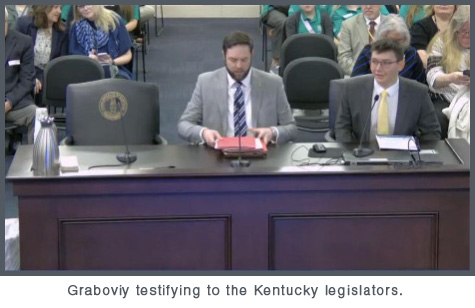When Governor Andy Beshear signed House Bill 342 into law on March 24, 2025, the commonwealth of Kentucky became the 27th state* to officially require students to take a personal finance course to graduate high school. The bill passed unanimously, a testament to the broad bipartisan support for financial education. Patrick Graboviy, a Kentucky high school student, championed the bill’s success by pushing lawmakers to recognize the importance of financial education for all. Thanks to the efforts of Graboviy and Kentucky lawmakers, the state will move to a comprehensive approach that ensures every student has access to the skills and knowledge needed to improve their financial well-being.

“My big thing is the American Dream. My parents are from Ukraine, and when they came in the 1990’s as refugees from the Soviet Union, they only survived because they knew how to save their money. Personal finance gives you the foundation for the American Dream. I hope this class gives (students) the skills and empowerment they need to do whatever it is that they want.
-- Patrick Graboviy
Graboviy’s role as an advocate began through an internship with the Kentucky State Treasurer’s Office and the Kentucky Financial Empowerment Commission (KFEC). Through that experience, he identified the limitations of optional and ad hoc financial education efforts, and the need to ensure universal access to high-quality instruction for all Kentuckians. Inspired to close the gaps he saw in the state’s offerings, Graboviy raised the issue with his state representative and proactively engaged with lawmakers throughout the process. He leveraged resources from the National Endowment for Financial Education (NEFE), and others, to make the case to the state assembly and overcome obstacles along the way, including a brief holdup in the Kentucky House education committee.
“I started using NEFE resources, printing out the research and stats, and going to lawmakers’ offices asking why this wasn’t passing. Then, it passed the Kentucky House committee unanimously,” says Graboviy.
Nationwide public sentiment mirrors the bipartisan support from the Kentucky legislature. A recent opinion poll from NEFE finds 83% of U.S. adults think their state should require a semester- or year-long personal finance course to graduate high school, with 82% or respondents who attended high school wishing they were required to complete a personal finance course while they were in school. The research outlines clear benefits for those needing convincing, and Graboviy utilized this data to change lawmakers’ minds. Research shows that high school students required to take a personal finance course are 2.1% less likely to carry a credit card balance, and the use of subsidized Federal Direct Loan by these students to fund their post-secondary education increased by 5.7%. Young adults who take personal finance in high school are 4% less likely to take out payday loans. Research also shows that providing a stand-alone course is more effective than embedding financial education into another course, and Graboviy made it known that this was not a point for compromise.
“In the Kentucky Senate, they did try to eliminate the credit requirement altogether, but we put a hard no on that and forced a vote,” says Graboviy.
While the research is clear, making the case requires active advocacy, and few advocates can do so as convincingly as a motivated student.
“When I went in for my committee hearing, there was an entire packet of research materials I had printed at school, and I went in before the committee hearing started and put these papers on their desks. They looked at these materials and realized the good that this does.
One piece of information that inspired the eventual support of Kentucky lawmakers was the actions of other states in the region. Six of Kentucky’s seven neighboring states had already passed such requirements.
“One thing that helped was (NEFE’s) partnership with the Appalachian College Association. Because people saw ‘Appalachia,’ and saw (NEFE’s) states requirements map that showed Tennessee and West Virginia had (requirements), it showed the regional support,” says Graboviy.

Recognizing the opportunity to do the same in Kentucky, Graboviy led the charge on behalf of future students and utilized the support of his peers to make a bigger impact. “I would create a template and send it to my friends and ask them to email their legislator,” he says. Graboviy noted that the moral support of his teachers and classmates went a long way in helping him persist, even if he did most of the legwork himself. His efforts and success demonstrate that the interest and motivation of students around this issue can be remarkably effective. “If you’re passionate about it, do it. You’ll learn along the way. It is a long journey and does require perseverance, but that is why we do things,” he adds.
Thanks to the dedication of Graboviy, the support of his classmates and teachers, and the recognition of Kentucky’s lawmakers, the high school class of 2029 will be the first to have all graduates complete a personal finance course. As Kentucky charts a new path to fulfill this requirement, the treasurer’s office and the KFEC, where Graboviy found his inspiration, will be critical in effectively implementing the requirement. Graboviy will be completing his senior year at North Oldham High School outside of Louisville, Ky. next school year, and then will set off on his next chapter knowing he has helped make a difference with his voice. “The community gave so much to me and my family. I want to make sure that people in our country—and people that look at our country—know that with these skills, and because of this education, they can do whatever they want,” Graboviy adds.
“What I truly appreciate about (Patrick) as a student advocate in Kentucky, is his hard work behind the scenes pushing for this change to ensure that his fellow students receive financial education before graduating,” says Billy Hensley, Ph.D., president and CEO of NEFE. “Congratulations to him and his fellow advocates for this success that will impact future generations.”
To learn more about pending legislation and states that already have a financial education graduation requirement, please visit NEFE’s Financial Education Policy Tracking. To learn more about best practices for implementing a financial education graduation requirement NEFE has released a series of implementation position papers.
*With the recent passing and signing of legislation in Colorado and Texas, the number of states with course requirements for high school graduation at the time of this publication is 29.
Hunter Field is Manager, Policy and Advocacy for the National Endowment for Financial Education (NEFE), a nonprofit foundation that champions effective financial education. NEFE is the independent, centralizing voice providing leadership, research and collaboration to advance financial well-being.

